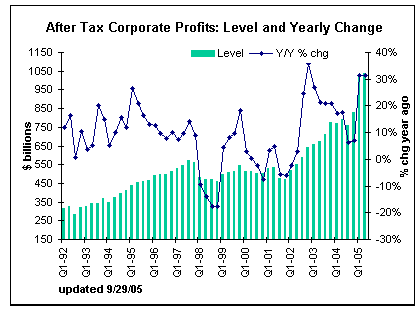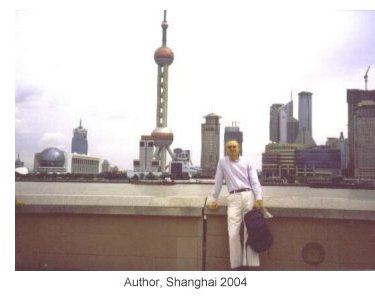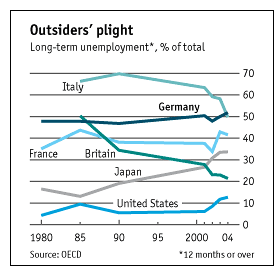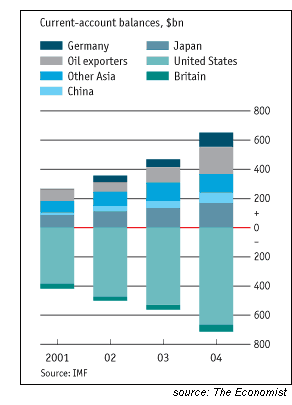

|
| weblog/wEssays archives | home | |
|
Trade War with China: Who Benefits? (April 11, 2007) Frequent contributor Albert T. has been alerting me in recent weeks to what he terms "the protectionist cycle" in which trade disputes ratchet up in rhetoric and action--with potentially dire consequences for the global and U.S. economy. Those familiar with history will recall that protectionist tariffs are often cited as one of the proximate causes of the Great Depression. (For an excellent history of that era, correspondent U. Doran recommends The Great Crash 1929 For a taste of just how widespread protectionist emotions have become, Albert sent these links: U.S. Cites Partners for Unfair Barriers China demands U.S. scrap anti-subsidy duties China hits EU imports with tariffs And in the midst of all this hullabaloo about China's trade surplus, we learn China's Trade Surplus Dives in March. If we cool the rhetoric, then we might notice that China's China's record-high global trade surplus of $177.5 billion last year is dwarfed by the U.S.'s 2006 trade deficit of $805 billion and on par with Germany's massive trade surplus. So is the problem that China is selling too much, or is the U.S. is buying too much? I submit (documentation below) that the real benefactors of this huge trade imbalance are U.S. corporations, which have fattened their annual profits to $1.3 trillion, largely drawn from importing goods and services from Asia and then marking them up with huge profit margins. But revealing that dirty little secret doesn't play well politically, so the usual hacks are out in force, demanding China rectify the imbalance created by gluttonous U.S. corporations and their shopaholic customers. The Wall Street Journal's Morning Brief of April 10 summarized the situation as well as anyone: U.S. relations with China have entered an era of aggressive trade policy, and this morning's trade numbers out of Beijing are only likely to bolster the hawkish case being made in Washington.  The protectionist hysteria gaining mindshare in Congress may be good politics
to some, but it overlooks one simple fact about U.S.-China trade:
the U.S. is making out like a bandit.
The protectionist hysteria gaining mindshare in Congress may be good politics
to some, but it overlooks one simple fact about U.S.-China trade:
the U.S. is making out like a bandit.
What supports this shocking statement? Everything. If anyone has cause to get sore, it's the Chinese, and here's why. So who's making all the profits in this trade? The U.S. companies. This was carefully documented in an August 2005 article in Foreign Affairs entitled A Trade War with China?. The author demolishes all the hearsay arguments about how trade with China is detrimental to the U.S. economy, revealing that much of China's manufacturing is owned and managed by foreign corporations. In effect, the companies aren't Chinese at all; only the workers are Chinese. 
These days manufacturers in China seem unable to pass on the higher costs. Wage inflation is "eating into margins. There is very little pricing power in China -- or globally, anywhere -- anymore," says Michael Barbalas, general manager at the Suzhou factory of Andrew Corp., a Westchester,Illinois maker of wireless networking gear. "You can't negotiate with Wal-Mart , and if you're selling to the large electronics firms, you don't have a lot of pricing power, either." For people bemoaning the loss of manufacturing jobs in the U.S., here's a suggestion: get real. Companies go where they have to in order to survive and prosper in a world where foreign corporations will gladly take sales away from them. If they don't compete on quality and price, they wither. For a better understanding of the realities of the global marketplace, read this Foreign Affairs article, Offshoring: The Next Industrial Revolution?  Many U.S. companies still have huge American manufacturing workforces--Catepillar and Boeing
come to mind, both global leaders which generate big profits--but they also manufacture
components in other nations as well, for a number of compelling reasons which may have little or
nothing to do with low-cost labor. Boeing, for instance,
essentially guarantees sales in Japan by subcontracting out the wing assemblies to high-tech
Japanese manufacturers. No parts made in Japan, no sales in Japan, and so fewer planes made
in Seattle. Pink slips fly, both in Japan and America--not good for anyone.
Many U.S. companies still have huge American manufacturing workforces--Catepillar and Boeing
come to mind, both global leaders which generate big profits--but they also manufacture
components in other nations as well, for a number of compelling reasons which may have little or
nothing to do with low-cost labor. Boeing, for instance,
essentially guarantees sales in Japan by subcontracting out the wing assemblies to high-tech
Japanese manufacturers. No parts made in Japan, no sales in Japan, and so fewer planes made
in Seattle. Pink slips fly, both in Japan and America--not good for anyone.
If you compare the rates of "hard core" long-term unemployment in the industrialized nations (see chart), then you'll see that the U.S. workforce has a far smaller problem than the European nations, which are staggering beneath a long-term unemployment rate of 40% - 50%. 
The U.S., on the other hand, exported $819 billion and imported an astonishing $1,526 billion in 2004--and the imbalance grew to $805 billion in 2005 before dropping slightly (due to the lower cost of oil) to "only" $765 billion in 2006. For more statistics, visit the U.S. government site of the Bureau of Economic Analysis. So exactly what are the Chinese gaining from this supposedly favorable trade? How about massive environmental damage and the resulting health costs, a potentially devastating asset bubble, a trillion dollars in risky dollar-denominated bonds, and a bunch of foreign-owned factories which will move to the lower-cost competition once wages rise in China. Meanwhile, what has the U.S. gained? Enormous, unprecedented corporate profits, offshored environmental waste, cheap goods, and the off-loading of huge debt. So who's in denial about the benefits to American companies of the "trade imbalance"? Who's in denial about American ownership (or half-ownership) of factories in China? Who's in denial that eliminating the trade with China won't bring a single job back to the U.S. but will export those jobs to Thailand, Vietnam, Romania, Mexico, India, etc.? Before we launch a politically expedient trade war, perhaps we should consider who's benefited from the trade to date. Here is a piece I wrote on the subject way back in 2005: China Trade Surplus: Gusher Profits for U.S. Corporations (8/13/05) Note: some parts of today's entry were drawn from an August 2006 entry on the same subject.) If this report provided you something you haven't found elsewhere, then perhaps you'd like to Your readership is greatly appreciated with or without a donation. For more on this subject and a wide array of other topics, please visit my weblog. copyright © 2007 Charles Hugh Smith. All rights reserved in all media. I would be honored if you linked this wEssay to your site, or printed a copy for your own use. |
||
| weblog/wEssays | home |